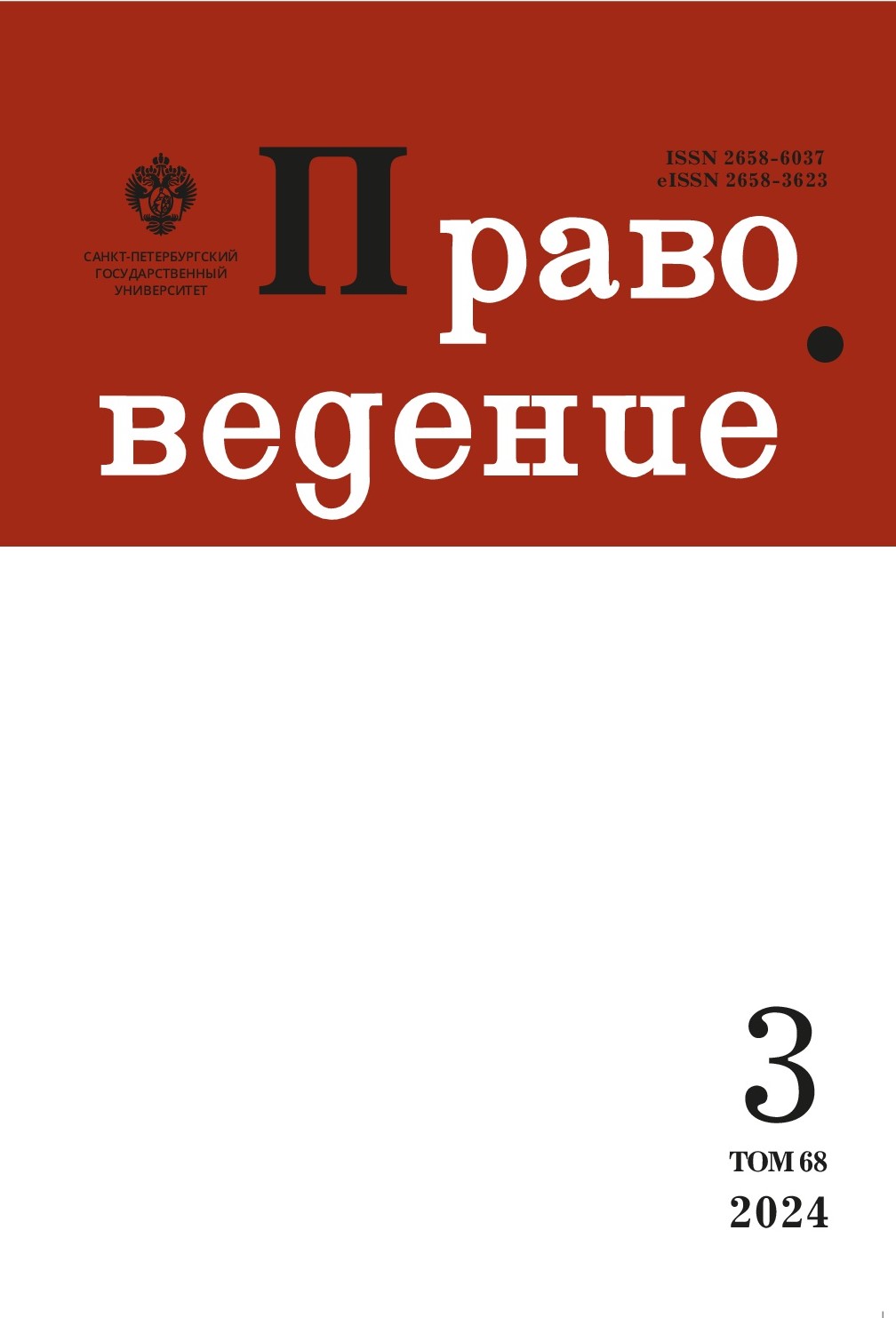Economic analysis of the institution of judicial expenses as a factor of the effectiveness of justice
DOI:
https://doi.org/10.21638/spbu25.2024.301Abstract
The paper examines the institute of court costs and possible ways of its improvement. The compensatory and preventive functions of this institution are highlighted, and the inadmissibility of reducing the effectiveness of justice only to its accessibility is substantiated. It is noted that the low cost of court proceedings violates the balance between the various criteria of the effectiveness of justice. With this in mind, the author considers the regulation of the institute of court costs in modern Russia in two key aspects: firstly, in terms of the reasonableness of the rates of state duty for applying to court; secondly, in terms of the validity of the rules of reimbursement of expenses for payment for the services of representatives. Based on the results of the analysis of the state duty rates, the conclusion is formulated that at the current rates the state duty has lost its economic sense and is unable to fulfil its preventive function. The author emphasises that the rates of state duty have remained unchanged for many years, despite a significant increase in the average per capita income of population and a high level of accumulated inflation. Taking this into account, it is proposed to determine the procedure for regular revision of the amount of state duty, to differentiate its rates for individuals and legal entities, as well as for different courts. As a possible reference point for legislative changes, the German model is considered, which assumes the calculation of the amount of state duty in two stages. As part of the analysis of the rules of reimbursement of expenses for payment for the services of representatives, it is noted that they are of an evaluative nature and, as a result, the courts systematically reduce the amount of expenses charged by the courts. Two cases considered by the Judicial Collegium for Civil Cases of the Supreme Court of the Russian Federation are cited as examples. The main direction of the reform of the institute of court costs in this part, in the author’s opinion, should be the narrowing of discretionary powers of judges. A point of view is expressed that the reasonableness (disproportionality) of court costs should be understood not as comparability with ordinary costs, but as equality to the actual costs that were incurred by the claimant solely for the restoration of his violated right. It is separately noted that when assessing the reasonableness of court costs, courts should consider the level of qualification of legal representative.
Keywords:
economics of justice, judicial workload, legal costs, state fees, of paying representatives
Downloads
References
Barkai, John, Kent, Elizabeth, Martin, Pamela. 2006. A Profile of Settlement. Court Review: The Journal of the American Judges Association 42 (3–4): 34–39.
Bocharov, Timur Yu., Volkov, Vadim V., Voskobitova, Lidiya A., Dmitrieva, Arina V., Tsvetkov, Igor V., Titaev, Kirill D., Smola, Anna A. 2018. Proposals for improving the judicial system in the Russian Federation and changing regulations for the purpose of their implementation. Moscow, Tsentr strategicheskikh razrabotok Publ.; St. Petersburg, Institut problem pravoprimeneniia pri Evropeiskom universitete v Sankt-Peterburge Publ. (In Russian)
Borisova, Elena A. 2020. Judicial reconciliation in the Republic of Korea. Judicial and non-judicial forms of protection of civil rights: A collection of articles for the anniversary of Doctor of Law, Professor Elena Ivanovna Nosyreva. Moscow: Infotropik Media Publ.: 209–215. (In Russian)
Kashanin, Andey V., Malov, Dmitri V. 2021. Small and indisputable cases in Russian courts. Moscow, HSE Publishing House.. (In Russian)
Krasnozhenov, Grigory G., Panarina, Maria M., Belkovich, Rodion Yu. 2022. Report on the research work “Development of workload standards for judges of courts of general jurisdiction and their staff, judges of federal arbitration courts and their staff” (final). Moscow. (In Russian)
Momotov, Victor V. 2017. Market of judicial representation: from the experience of the continental and Anglo-Saxon legal traditions. Zhurnal zarubezhnogo zakonodatel’stva i sravnitel’nogo pravovedeniia 4: 43–51. (In Russian)
Pepeliaev, Sergey G. 2013. Compensation for expenses for legal assistance in arbitration courts. Moscow, Alpina Publisher. (In Russian)
Pepeliaev, Sergey G. 2013. On the legal nature of the institution of legal expenses. Zakon 11: 106–112. (In Russian)
Shmotin, Kirill S. 2018. Legal expenses in civil proceedings: PhD Thesis in Law. Moscow. (In Russian)
Vereshchagin, Aleksandr N., Nazarov, Vladimir S. 2016. Court fees: what should they be? Zakon 4: 26–37. (In Russian)
Downloads
Published
How to Cite
Issue
Section
License
Articles of "Pravovedenie" are open access distributed under the terms of the License Agreement with Saint Petersburg State University, which permits to the authors unrestricted distribution and self-archiving free of charge.




